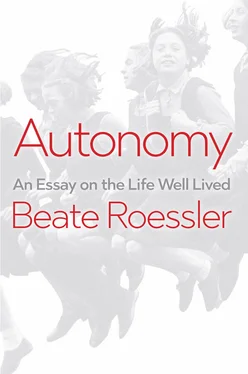Hence, in order to take a further step in the direction of autonomy, it will be helpful to look at a second critique of Berlin, this one from Gerald MacCallum, who argues that every concept of freedom necessarily incorporates three elements that different conceptions interpret differently only in terms of their relation to each other. 18Thus even negative and positive liberty remain incomplete if they do not take these three elements into account in equal measure. MacCallum illustrates this with the formula “ x is free from y to do z .” 19While element y negatively refers to the absence of obstacles, z shows that we always conceive of freedom positively because we want to have certain courses of action available to us. A complete concept of liberty, however, also includes a third element, x , the free, determining subject, which can also be variously defined. MacCallum argues that these three elements are always implicitly or explicitly assumed in every notion of freedom, and only together do they constitute a full concept of freedom, its meaning, and its value for us.
But even this conception is not yet sufficient for determining the relationship between autonomy and freedom. For if I am persuaded – or, even more strongly, subtly manipulated – into making a certain decision, this might not necessarily be described as restricting my negative liberty, and perhaps the option I was persuaded to choose is even quite reasonable and attractive. Maybe I even would have wanted to make the same choice without having been manipulated at all. But is it my freedom that I’m living in this case? Is it an autonomous choice and decision? Only now can we see that autonomy is not an alternative to but a concretization of the concept of freedom. For only now can we see that we are free in our choices only when it is we ourselves who are doing the choosing. This also explains why we value being able to make our own choices. It is not only what we choose that is valuable to us, and not only the fact that we are unimpeded in making our choices, but also the possibility and the act of choosing itself , the fact that I am the one who can make a decision for myself. The significance that the act of choosing has for us is part of the value and meaning of autonomy.
Now one could of course say that the idea of autonomy I have elaborated up to this point is too simple and must be confronted with a whole complex of critical questions if it is to be a viable concept. Such questions will frequently play a role in the coming chapters. Here, however, I would like to mention three fundamental objections, which I will address more fully later. The first comes from theories of perfectionism, which maintains that subjects are only autonomous when they decide in favor of certain good and reasonable options. Autonomous subjects are thus only truly free when they make the right choice . On the one hand, this means that a life chosen and lived autonomously can only be a good, well-lived life if subjects pursue the right, sensible, and (morally) good aims. And, on the other hand, it also affords a special role to the state, namely assuring that subjects are presented with not only sufficiently different options but also the right options. Hence the state is no longer entirely neutral, and both – the non-neutral state and the idea of “right” options – are naturally problematic for liberal theories. Even the question of whether the state should be able to help by nudging individuals in the direction of a good, proper, healthy life is controversial. 20I will discuss these problems of perfectionism in greater detail in chapter 6.
With this, I come to the second objection: How transparent are subjects to themselves in their own reflections when they believe that they are choosing and living autonomously and authentically, i.e. when they believe that they are acting according to their own reasons for their own reasons? Following Freud, one could argue that just because subjects claim to do what they want, it does not follow that they are free and autonomous and actually do what they want. There could always be driving forces and motivations that are unconscious and inaccessible to us and that impede us from certain actions or intentions, as we know, for example, from studies of the widespread phenomenon of self-deception. Hence it is naive to simply proceed from a concept of autonomy based on the idea of a self that sees through or is at least potentially transparent to itself. Here, however, we will see that autonomy is defensible on the basis of the idea that even autonomous decisions must remain open to criticism – not because others necessarily always know better what is good for us, but precisely because as reflexive beings , we are aware that in every individual case, our reflections may be skewed or distorted and must be examined more closely. With my conception of autonomy, I precisely do not presume agents who are entirely transparent to themselves, but rather realistic conditions and agents. I will return to this in chapter 4.
The third objection points to the danger arising from the fact that there exist not only distortive individual structures but also social structures that can prevent subjects from acting freely and autonomously in their choices and opportunities. This goes beyond direct impediments to our freedom. In a consumer society, are we not manipulated at least to such an extent that we want to consume as much as possible? Are we still able to define the value that consumption has for us? Are men and women in a patriarchal society capable of undermining discriminatory and stereotypical gender roles? Can autonomy and authenticity be defined at all independently of distortive constitutive social conditions? Such questions were posed in the tradition of the early Frankfurt School, which analyzed and answered them using the concepts of ideology and “false consciousness.” Today, they are often debated in terms of other concepts such as adaptive preferences. Autonomy and freedom are always determined by social, cultural, and political contexts, both positively (in terms of how autonomy is enabled or facilitated) and negatively (in terms of how autonomy is restricted or threatened). It is this very complex of problems that I address in chapter 8, on autonomy and its social preconditions. For the concept of autonomy that I am developing here makes it possible and even necessary not only to attribute autonomy under certain conditions to individuals in non-liberal-democratic societies but also precisely not to ascribe it – at least under certain circumstances and in certain respects – to individuals in liberal-democratic societies.
Conditions of individual autonomy
Freedom rights enable autonomy; autonomy concretizes a general concept of freedom. Accordingly, autonomy, properly understood, involves both the absence of obstacles and a horizon of options that are meaningful and desirable in a very broad sense. It also involves an autonomous person who, in reflecting on the question of how she wants to live, is capable of grappling and identifying with her own ideas and desires within a given social context. This is the framework within which we can more precisely define what autonomy as a capacity means and what qualities we must attribute to autonomous persons in order to be able to characterize them as autonomous. I want to briefly outline this here, but only the individual chapters will be able to give a more complete picture of the various aspects, problems, and tensions involved in the concept of autonomy. 21
Persons are autonomous when they can ask themselves how they want to live and how they should live. We saw this above with Mill as well as in Kant’s Metaphysics of Morals . Ernst Tugendhat describes the question of how one wants to live, what kind of person one wants to be, as a practical one: “[W]e are free in the sense of self-determination if we act on the basis of an explicit or implicit process of deliberation in which the practical question is posed in its fundamental sense.” 22Autonomy aims at asking, or at least being able to ask, ourselves regularly – even in the course of our daily routines – whether the life we are living is really the life that we want to live, a life that is our own . Although we are only ever autonomous in dealing or engaging with others, in relationships – we are never autonomous in total isolation – the responsibility for our own plans and projects nevertheless lies with us. I use the technical term “projects” here as a catchall for those things that are important to us in our lives: our career plans, family relationships, friendships, political interests, and so on. Projects form the content of our lives and we pursue them as autonomously as possible when we devise them ourselves, when we decide – reasonably independently – to pursue them, and when we determine our own actions in the course of this pursuit. Such plans or projects always exist within a framework of particular values and beliefs, and even if we are not always able to choose them ourselves (as in the case of family relationships), we can still accept them, endorse them, stand behind them as our own. When I use the terms “plans” or “projects” in the ensuing chapters, then, I also mean relationships – family relationships, romantic relationships, and friendships – that we decide to embrace and that are part of our lives.
Читать дальше












